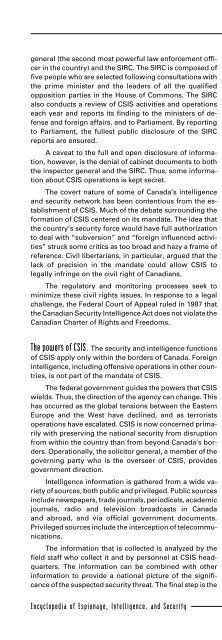ENCYCLOPEDIA OF Espionage, Intelligence, and Security Volume ...
ENCYCLOPEDIA OF Espionage, Intelligence, and Security Volume ...
ENCYCLOPEDIA OF Espionage, Intelligence, and Security Volume ...
You also want an ePaper? Increase the reach of your titles
YUMPU automatically turns print PDFs into web optimized ePapers that Google loves.
Canine Substance Detectiongeneral (the second most powerful law enforcement officerin the country) <strong>and</strong> the SIRC. The SIRC is composed offive people who are selected following consultations withthe prime minister <strong>and</strong> the leaders of all the qualifiedopposition parties in the House of Commons. The SIRCalso conducts a review of CSIS activities <strong>and</strong> operationseach year <strong>and</strong> reports its finding to the ministers of defense<strong>and</strong> foreign affairs, <strong>and</strong> to Parliament. By reportingto Parliament, the fullest public disclosure of the SIRCreports are ensured.A caveat to the full <strong>and</strong> open disclosure of information,however, is the denial of cabinet documents to boththe inspector general <strong>and</strong> the SIRC. Thus, some informationabout CSIS operations is kept secret.The covert nature of some of Canada’s intelligence<strong>and</strong> security network has been contentious from the establishmentof CSIS. Much of the debate surrounding theformation of CSIS centered on its m<strong>and</strong>ate. The idea thatthe country’s security force would have full authorizationto deal with “subversion” <strong>and</strong> “foreign influenced activities”struck some critics as too broad <strong>and</strong> hazy a frame ofreference. Civil libertarians, in particular, argued that thelack of precision in the m<strong>and</strong>ate could allow CSIS tolegally infringe on the civil right of Canadians.The regulatory <strong>and</strong> monitoring processes seek tominimize these civil rights issues. In response to a legalchallenge, the Federal Court of Appeal ruled in 1987 thatthe Canadian <strong>Security</strong> <strong>Intelligence</strong> Act does not violate theCanadian Charter of Rights <strong>and</strong> Freedoms.The powers of CSIS. The security <strong>and</strong> intelligence functionsof CSIS apply only within the borders of Canada. Foreignintelligence, including offensive operations in other countries,is not part of the m<strong>and</strong>ate of CSIS.The federal government guides the powers that CSISwields. Thus, the direction of the agency can change. Thishas occurred as the global tensions between the EasternEurope <strong>and</strong> the West have declined, <strong>and</strong> as terroristsoperations have escalated. CSIS is now concerned primarilywith preserving the national security from disruptionfrom within the country than from beyond Canada’s borders.Operationally, the solicitor general, a member of thegoverning party who is the overseer of CSIS, providesgovernment direction.<strong>Intelligence</strong> information is gathered from a wide varietyof sources, both public <strong>and</strong> privileged. Public sourcesinclude newspapers, trade journals, periodicals, academicjournals, radio <strong>and</strong> television broadcasts in Canada<strong>and</strong> abroad, <strong>and</strong> via official government documents.Privileged sources include the interception of telecommunications.The information that is collected is analyzed by thefield staff who collect it <strong>and</strong> by personnel at CSIS headquarters.The information can be combined with otherinformation to provide a national picture of the significanceof the suspected security threat. The final step is theEncyclopedia of <strong>Espionage</strong>, <strong>Intelligence</strong>, <strong>and</strong> <strong>Security</strong>release of the analysis to the concerned governmentdepartments.One of the main analysis reports is known as a threatassessment. Different departments use the threat assessmentto determine responses. For example, the RCMP canuse a threat assessment to gauge the degree of securityprovided to a visiting dignitaries <strong>and</strong> to prominent Canadianstraveling abroad. As another example, the Departmentof Foreign Affairs <strong>and</strong> International Trade will use athreat assessment report to provide the proper security toCanadian business <strong>and</strong> governmental missions in foreigncountries. Transport Canada also uses the assessment toissue warnings to the general public about travel.As of late 2003, the primary role of CSIS is the safetyof Canadians from security threats. This includes terroristactivity. As such, much of the information that CSIS collectson terrorist activities is shared with security <strong>and</strong>enforcement agencies in other countries including theUnited States.❚ FURTHER READING:BOOKS:Cleroux, Richard. Official Secrets: The Story behind theCanadian <strong>Security</strong> <strong>Intelligence</strong> Service.Toronto: McGraw-Hill Ryerson,1990.Hewitt, Steven. Spying 101: The RCMP’s Secret Activitiesat Canadian Universities.Toronto: University of TorontoPress,2002.Starnes, John. Closely Guarded: A Life in Canadian <strong>Security</strong><strong>and</strong> <strong>Intelligence</strong>.Toronto: University of TorontoPress,2001.PERIODICALS:Farson, S.A. “Is Canadian <strong>Intelligence</strong> Being Re-Invented?”Canadian Foreign Policy no. 6 (1999): 49–83.ELECTRONIC:Canadian <strong>Security</strong> <strong>Intelligence</strong> Service. “A Historical Perspectiveon CSIS.” Government of Canada. November01, 2001. (06 December 2002).Library of Parliament. “The Canadian <strong>Security</strong> <strong>Intelligence</strong>Service.” Parliamentary Research Branch. January 24,2000. (06 December 2002).Canine Substance Detection❚ JUDYTH SASSOONCanine substance detection involves the use of speciallytrained dogs, commonly golden or Labrador retrievers,for the detection of illegal substances. Dogs of this kindare now being used in various different situations, such as163







![The Big Lie 9-11 and Government Complicity in Mass Murder [PDF]](https://img.yumpu.com/50957077/1/190x245/the-big-lie-9-11-and-government-complicity-in-mass-murder-pdf.jpg?quality=85)








